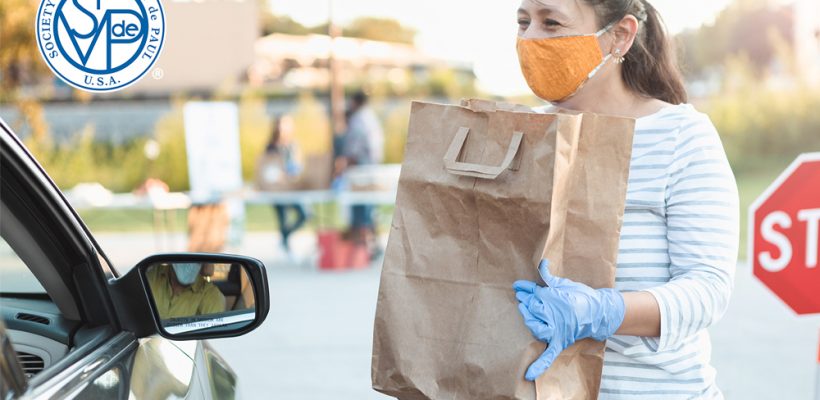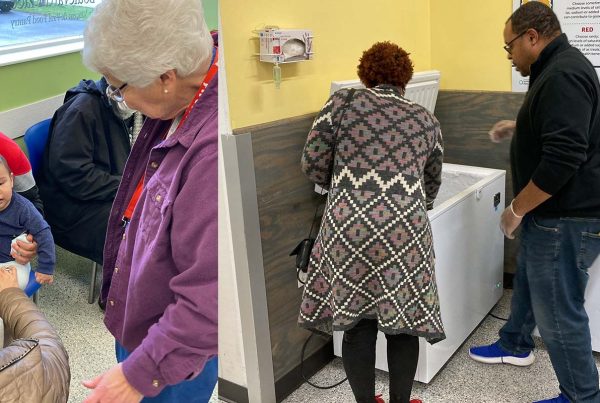By Cindy Brown, Director of Boulevard Place Food Pantry
COVID-19 started as a big unknown. Would this scary, mysterious disease make its way from Wuhan, China, to our humble food pantry in Butler-Tarkington? We didn’t know. By early March 2020, all of us at 4200 Boulevard Place began to learn several new phrases such as “Social distance … Don’t touch your face … Wash your hands often.”
Within the first week, I had two or three volunteers who were pushing me for answers regarding how Boulevard Place could let clients shop (elbow to elbow in many situations) and at the same time operate safely. There was little to no guidance, as COVID-19 was new to everyone. It seemed to disproportionately target senior citizens, and many of our volunteers fit that criteria.
COVID-19 safety concerns took on a fast track.
We still had our Tuesday crew show up on March 10, 2020, to accept frozen goods and non-perishables from the regular Gleaners delivery truck. Two days later, on March 12, I had discussions with a couple of pantry partners comparing notes on operational procedures, given federal requirements in place at the time. TEFAP (USDA’s The Emergency Food Assistance Program) required that we operate as a self-select pantry—where clients shop for themselves—but COVID-19 made that difficult.
I learned from SVdP and others that we could change our operating model to allow for drive-up, pre-packaged food handouts. While I considered alternative ways to operate, we went ahead with our normal (inside/self-select) Friday morning shift (March 13), Saturday morning shift (March 14), and Monday morning and afternoon shifts (March 16).
On March 16, we received a waiver from TEFAP suspending the requirements for self-select, thereby allowing our pantry to pre-package TEFAP food (such as boxed orange juice, canned pears and red apples). We operated our first drive-up curbside pre-packaged food handout on Wednesday, March 18, serving two shifts of clients. We did not operate a shift on Friday so that we could bag food for the Saturday shift. We served a record number of clients (120) on Saturday, March 21. To give you some context, during a regular Saturday we would have served 65. Not all of us were wearing masks.
As we operated the March 21 shift and over the weekend, COVID-19 illnesses were understandingly creating a scare to all of us. Again, very little guidance was being provided.
Space in our pantry was constrained and volunteers were unable to safely bag food inside given our tight operations. At the same time, Indiana was considering a stay-at-home order; there was a “flatten the curve” mentality that led to many businesses closing or making employees remote, with schools shifting to e-learning around the time of spring break. Very scary.
It became clear to me that in order to figure out a safety protocol, Boulevard Place would need to temporarily shut down. We operated our last drive-up curbside distribution shift on Monday, March 23. We canceled our Tuesday, March 24 deliveries. On Wednesday, March 25, Indiana did issue a stay-at-home order and that day we temporarily closed the pantry.
Prior to our closure, on Tuesday, March 24, I was contacted by the social director for Andrew’s Garden apartments. She advised that many of her tenants were elderly, homebound and could not get transportation to a pantry. We discussed and agreed that Boulevard Place would bring food bags to the tenants in the apartments. That day we took 300 bags serving 88 residents. Not many people know this!
Boulevard Place remained closed as we reimagined what things would be when we returned to normal, projected to be Wednesday, April 22. During the four-week closure, we cleaned the pantry. Our interior shelves were on wheels, fortunately, and we removed those items to create as much open operating space as possible. We decided upon new operating hours and devised a method for operating a curbside distribution. It was quite a change as we went from eight shifts, 17 hours a week to three shifts, six hours a week. We bought a pop-up tent and saved bread crates to serve as a place to set the food outdoors prior to loading cars.
When we re-opened, we didn’t have the same volunteers as before. But we welcomed fresh faces into new roles and what started off as unusual eventually became our new normal—especially in July 2020 when we held our groundbreaking and got our expansion going. A year later, we’re not shaking hands and remain distant from each other and, of course, we wear masks while indoors. We’re doing whatever it takes to fulfill our mission to help out hungry neighbors.





